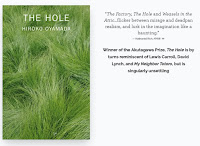Again, reading about the life of a housewife with memory lapses in 'The Hole' by Hiroko Oyamada (2014) ; 「穴」小山田浩子, isn't my idea of cool. I don't know if the forest is fantastical in her mind, and the mythical animal she saw is simply native to the region. Anyway.
Translated by David Boyd and published in English in 2020, reviews chose to look at the book's 'bizarre' tale as a representation of gender roles in society, along with young married couples' economic worries, the sense of dislocation, and also the relationship between mother-in-law and daughter-in-law. (Reviews here, here, here and here.)
In an oppressively hot summer, protagonist Asahi 'Asa' and her husband Muneaki Matsuura have just moved to the countryside for his newly transferred job. As such, she hasn't gotten a job, but their finances are okay because they live rent-free in a house here that happens to be owned by her in-laws. Asa seems to have holes in her memory since she can't seem to describe her previous job or even remember what her husband's job is.
It's a very small town. A village in the countryside. Job opportunities are rare. There're many retirees and elderly in the village, and very little young adults or children. This is a huge change from the couple's previous lives in Tokyo, when both had jobs that occupied all their time. When I finished reading this long paragraph about her new life in the village, I was equally numb. I shuddered to think of such a life for myself. To have to prep meals for my husband twice a day? And pack lunch for him? OMG. To prep, cook and clean all day. NO.
In this small village, Asa isn't even called by her name; she is referred to as "the bride". The gender roles are stereotyped and clearly defined here. She falls into hole, and then many subsequent holes. There're so many metaphors in the story, and an eventual metamorphosis when towards the end of summer, and the end of the book, we learnt that she secured a job as a cashier at the local 7-Eleven.
Once I was finished at the supermarket, I'd spend the rest of the day at home. There were no libraries or malls or bookstores within walking distance. Once we'd finished moving in, I felt like a kid on summer vacation: no homework, no plans. I started looking for a job, but I was having trouble getting around. All I could do was check the bulletin boards at the grocery store and the other small businesses in the area. Under these circumstances, I couldn't imagine finding anything very soon. I'd wake up a little before six, pack my husband's lunch, make his breakfast, see him off, go shopping, clean the house, or maybe run the laundry — but after that, I didn't have anything to do. Living the dream? Really? It was weird to think about how, until now, I'd been working from morning till night. That life didn't seem real anymore. We were two different people: the me who had to work all day to make ends meet, and the me who had nothing to do after lunch except waste time until making dinner in the evening. I was pretty sure I'd get sick of my new routine within a week — but it only took a day. Every day after that was as mind-numbing as the one before, ad infinitum. In theory, I could watch TV, use the computer, read a book bake like I used to when I was single — but it seemed like everything cost money. I had to spend money to pass the time. People say housewives get free room and board and even time to nap, but the truth is napping was the most economical way to make it through the day. The house moved slowly, but the days passed with staggering speed. Soon I lost all sense of time. I didn't have any appointments or deadlines. The days were slipping through my fingers.

No comments:
Post a Comment